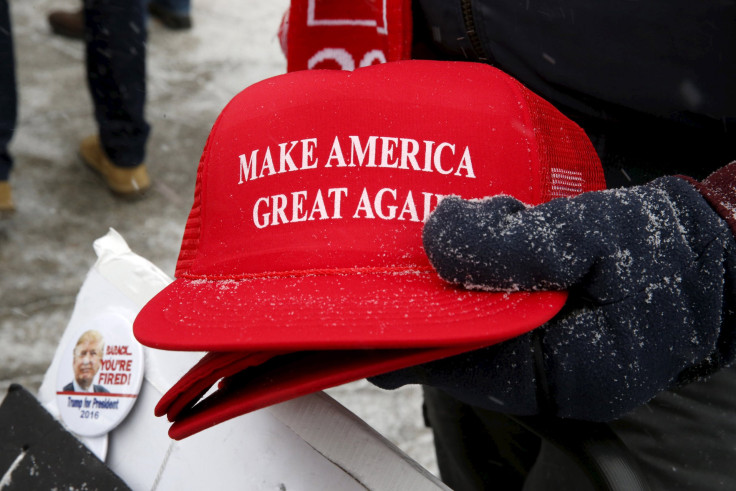Exclusive: US Labor Powerhouse To Launch Anti-Trump Ad Campaign

The AFL-CIO, the largest U.S. federation of labor unions, will launch digital attack ads targeting Republican front-runner Donald Trump next week as part of a multipronged effort to derail the New York billionaire’s bid for the White House and dampen union workers' enthusiasm for him.
Officials at the AFL-CIO, an umbrella group of 56 unions representing 12.5 million workers, told Reuters the ads will depict Trump as anti-union and will appear on Facebook and Twitter.
The officials said the anti-Trump advertising effort would likely expand over the coming months. At the same time, an AFL-CIO affiliate organization will ramp up a door-to-door campaign to undermine the candidate in Ohio and Pennsylvania, key battleground states in the Nov. 8 presidential election.
"Donald Trump has tapped into the very real and understandable anger of working people. But while he says he's with America's working people, when you look close, it's just hot air," AFL-CIO president Richard Trumka told Reuters. "Donald Trump is nothing but a house of cards, and once we educate people, the house of cards comes crashing down," he said.
Union leaders are increasingly concerned about Trump’s appeal to labor, typically a stronghold of the Democratic Party, because of his promises to scrap free-trade deals that have led to manufacturing job losses in the United States.
The AFL-CIO is entering the political fray several months earlier than in past elections, given the "unique cycle" created by Trump's candidacy, spokesman Josh Goldstein said.
The initial ads will be modeled after a text message blast that began Thursday featuring an image of Trump with a statement he made supporting "right to work" laws, which weaken organized labor by limiting their ability to collect membership dues. Several states have passed such laws, and the U.S. Congress has considered a similar measure.
"I like right-to-work. My position on right-to-work is 100 percent," Trump said in a radio interview in South Carolina last month.
The text campaign on which the ads will be modeled featured a quote from Trumka, hitting Trump on right-to-work and characterizing him as racist: "Donald Trump's bigoted comments are bad enough. Now he supports right-to-work. Tell him right-to-work is wrong for working people."
Trump has been widely criticized for describing Mexican illegal immigrants as rapists and criminals, and for proposing a temporary ban on Muslims seeking to come to the United States.
The AFL-CIO declined to say how much the initial digital ads would cost, but the federation spent nearly $9 million in the 2012 election cycle on outside spending in addition to money given directly to candidates, according to Open Secrets data.
The AFL-CIO typically waits to endorse a presidential candidate until there is a de facto Democratic nominee. But Trumka, a former coal miner and leader of that union, has made clear he believes Trump in particular would be a disastrous candidate for workers. In a speech last week he called him a "bigot" and "anti-American."
An official representing Trump's campaign was not immediately available to comment, but Trump has said repeatedly that he has support within unions.
'Up for Grabs'
National unions nearly always endorse Democratic presidential candidates, but Trump has built his insurgent campaign in part on a mission that many unions share: scrapping international trade deals.
There are some signs Trump's message is resonating beyond the 20 to 30 percent of rank-and-file union members that vote Republican, attracting political independents and even some frustrated Democrats.
At a recent picket outside a steel plant near Canton, Ohio, workers cited former President Bill Clinton's support of the North American Free Trade Agreement more than 20 years ago as a reason why they may support Trump over Democratic front-runner Hillary Clinton in a general election.
"For a lot of us, it's ABC - Anybody But Clinton," Mike Newbold told Reuters.
Clinton has said she evaluates every trade deal to make sure it protects workers and that she opposes one being finalized by the Obama administration. Her campaign said they are confident her plan to help struggling manufacturing areas will earn her support from union members.
AFL-CIO's affiliate, Working America, has noticed Trump's inroads with working-class Americans, and recently sent canvassers to talk to 1,689 likely voters with household income of $75,000 or less in Cleveland and Pittsburgh to learn more about Trump's appeal.
"Working-class voters are up for grabs this time in a really significant way. These folks need good information, and we'll fill that gap," Karen Nussbaum, executive director of Working America, said.
According to Nussbaum, workers said they were frustrated with politics and worried about the economy. Of those who had already settled on a candidate, 38 percent chose Trump. But more than half were still undecided.
She said the results of that initial canvas would be used to guide a massive door-to-door campaign to have more than half a million one-on-one conversations with Ohio voters during 2016 to help them "make decisions that actually solve their problems as opposed to phony solutions."
Working America is adding staff to its offices in Columbus and Cleveland to support the operation and will open another soon in Cincinnati, she said.
Labor strategist Steve Rosenthal said that in every presidential election there is a sense that white, working-class union men could desert the Democratic Party.
"But I think when all is said and done, when unions put their programs into gear, in person and one-on-one in homes and in their communities, union members will vote overwhelmingly for the Democratic nominee," Rosenthal said.
"Trump might have some appeal right now, but once you start to peel away his record — his manufacturing in China, his relationships with unions — he's a pretty good target."
© Copyright Thomson Reuters 2024. All rights reserved.











